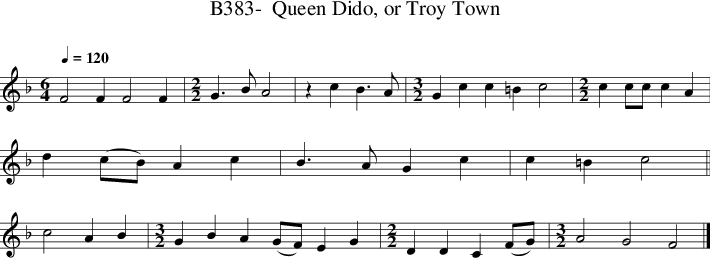15 March 1715: Frustrated lovers Martha Railton and Roger Wrightson of Bowes (North Riding) are buried together
David Mallet. 1760. Edwin and Emma. Edinburgh: Alexander Kincaid for A. Millar. Get it:
.Unedited excerpt
If an excerpt is used in the book, it will be shorter, edited and, where applicable, translated.
Extract of a letter from the Curate of Bowes in Yorkshire, on the subject of the preceding poem [Mallet’s Edwin and Emma].
To Mr. Copperthwaite at Marrick.
Worthy Sir,
⁂As to the affair mentioned in yours; it happened long before my time. I have therefore been obliged to consult my clerk, and another person in the neighbourhood for the truth of that melancholy event. The history of it is as follows.
The family name of the young man was Wrightson; of the young maiden Railton. They were both much of the same age; that is, growing up to twenty. In their birth was no disparity: but in fortune, alas! she was his inferior. His father, a hard old man, who had by his toil acquired a handsome competency, expected and required that his son should marry suitably. But, as amor vincit omnia, his heart was unalterably fixed on the pretty young creature already named. Their courtship, which was all by stealth, unknown to the family, continued about a year. When it was found our, old Wrightson, his wife, and particularly their crooked daughter Hannah, flouted at the maiden, and treated her with notable contempt. For they held it as a maxim, and a rustic one it is, That blood was nothing without groats.
The young lover sickened, and took to his bed about Shrove-Tuesday, and died the Sunday sennight after.
On the last day of his illness he desired to see his Mistress. She was civilly received by the Mother; who bid her welcome—when it was too late. But her daughter Hannah lay at his back; to cut them off from all opportunity of exchanging their thoughts.
At her return home, on hearing the bell toll out for his departure, she screamed aloud that her heart was burst, and expired some moments after.
The then Curate of Bowes[1] inserted it in his register, that they both died of love, and were buried in the same grave, March 15. 1714. I am,
Dear Sir,
Yours, &c.
Comment
Comment
Davison Ingledew (Davison Ingledew 1860) via Joseph Ritson (Ritson 1809):
BOWES TRAGEDY; OR, A PATTERN OF TRUE LOVE.
Roger Wrightson, at the sign of the King’s Head, in Bowes, in the N.R. of Yorkshire, courted widow Railton’s daughter, at the sign of the George in the same town, and has done more than a year. On Shrove Tuesday, 1715, he fell sick, and languished till Sunday next but one following, and after saying three times, “Martha, Martha, come away,” then died.Poor Martha (for that was the maid’s name whom he courted) Railton, though privately, took heavily on all that time, and only had declared to her sister and mother that if he died she could not live. An honest friend is unworthily blamed for doing what I would have done myself had I known it; for Martha Railton begged of him to go and see young Roger, and tell him she would gladly come and see him, if he thought fit (knowing all his father’s family was against her). Roger answered, “Nay, nay, T—my, our folks will be mad; but tell her I hope I shall recover.” Well, the poor lass, almost dead in sorrow, first sent an orange, but Roger’s mother sent it back; yet about three days before his death Martha went. His mother was so civil as to leave her by his bedside, and ordered her daughter Hannah to come away, but she would not. Poor Martha wanted only to speak three words to him, and (although she stayed two hours) yet Hannah would not let her have an opportunity, and so, in a sorrowful manner, she left him. Her book was her constant work Friday, Saturday, and Sunday; and she would oft say to herself, “Oh! you Hannah! if he dyes my heart will burst.” So on the same Sunday se’night, at five o’clock in the afternoon, the bell was tolled for him, and upon the first toll, Martha lay by her book, got her mother in her arms, with, “Oh! dear mother, he’s dead, I cannot live.” About three minutes after Thomas Petty went in and desired her to be more easy. Her answer was, “Nay, now my heart is burst!” And so, in mournful cries and prayers, was fainter and fainter, for about three hours, and seemed to breathe her last; but her mother and another girl of the town shrieked aloud, and so called her back again (as they term it), and, in amazed manner, distorted with convulsion fits (just as it is described in Dr. Taylor’s “Holy Living and Dying”), stayed her spirit ten or twelve hours longer, and then she died.
At last things was brought to this issue, to be buried both in one grave, and the corpses met at the church gate, but Hannah objected against their being buried together, as also she did at her being laid first in the grave; but was answered that a bride has to go first to bed. She, being asked why she should be so proud and inhumane, answered, that she said, “Martha might have taken fairer on, or have been hanged.” But oh, the loud mourning of friends on both sides at the corpse meeting, and more at the grave; wherein first she was decently laid, and then he. In the parish register of Bowes is the following entry:
Rodger Wrightson, junr., and Martha Railton, both of Bowes, buried in one grave. He died of a fever, and upon tolling his passing bell, she cried out ‘My heart is broke,’ and in a few hours expired, purely (or supposed, interlined in a different hand) through love. March 15, 1715, aged about 20 years each.
DI then prints the ballad, which he says was sung to “Queen Dido”:
Good Christian people, pray attend
To what I do in sorrow sing,
My bleeding heart is like to rend,
At the sad tydings which I bring;
Of a young couple, whom cruel fate
Designed to be unfortunate.Let Carthage Queen be now no more
The subject of your mournful song;
Nor such odd tales which heretofore,
Did so amuse the teeming throng;
Since the sad story which I’ll tell,
All other tragedys excel.Yorkshire, the ancient town of Bowes,
Of late did Roger Wrightson dwell,
He courted Martha Railton, who
In virtuous works did most excel;
Yet Roger’s friends would not agree,
That he to her should married be.Their love continued one whole year,
Full sore against their parents’ will;
But when he found them so severe,
His royal heart began to chill;
And last Shrove Tuesday took his bed,
With grief and woe encompassed.Thus he continued twelve days space,
In anguish and in grief of mind;
And no sweet rest in any case,
This ardent lover’s heart could find;
But languish’d in a train of grief,
Which pierced his heart beyond relief.Martha, with anxious thoughts possest
A private messuage to him sent,
Acquainting him she could not rest,
Until she had seen her loving friend;
His answer was, “Nay, nay, my dear,
Our folks will angry be I fear.”Full frought with grief, she took no rest,
But spent her time in pain and fear,
Until few days before his death,
She sent an orange to her dear;
But ‘s cruel mother, in disdain,
Did send the orange back again.Three days before her lover dy’d,
Poor Martha, with a bleeding heart,
To see her dying lover hy’d,
In hopes to ease him of his smart;
Where she’s conducted to the bed,
In which this faithful young man laid.Where she with doleful cries beheld,
Her fainting lover in despair;
Which did her heart with sorrow fill,
Small was the comfort she had there;
Tho’ his mother show’d her great respect,
His sister did her much reject.She staid two hours with her dear,
In hopes for to declare her mind;
But Hannah Wrightson stood so near,
No time to do it she could find:
So that being almost dead with grief,
Away she went without relief.Tears from her eyes did flow amain,
And she full oft wo’d sighing say,
“My constant love, alas! is slain,
And to pale death become a prey;
Oh! Hannah, Hannah, thou art base;
Thy pride will turn to foul disgrace.”She spent her time in godly prayers,
And quiet rest from her did fly,
She to her friends full oft declares,
She could not live if he did dye;
Thus she continued till the bell,
Began to sound his fatal knell.And when she heard the dismal sound,
Her godly book she cast away,
With bitter cries would pierce the ground,
Her fainting heart began to decay;
She to her pensive mother said,
“I cannot live now he is dead.”Then after three short minutes’ space,
As she in sorrow groaning lay,
A gentleman did her embrace,
And mildly unto her did say,
“Dear melting soul, be not so sad,
But let your passions be allayed.”Her answer was, “My heart is burst,
My span of life is near an end;
My love from me by death is forced,
My grief no soul can comprehend.”
Then her poor heart did soon wax faint,
When she had ended her complaint.For three hours’ space, as in a trance,
This broken-hearted creature lay,
Her mother wailing her mischance,
To pacify her did essay;
But all in vain, for strength being past,
She seemingly did breathe her last.Her mother, thinking she was dead,
Began to shriek and cry amain,
And heavy lamentations made,
Which call’d her spirit back again,
To be an object of hard fate,
And give to grief a longer date.Distorted with convulsions, she
In dreadful manner gasping lay,
Of twelve long hours no moment free,
Her bitter groans did all dismay;
Then her poor heart being sadly broke,
Submitted to the fatal stroke.When things were to this issue brought,
Both in one grave were to be laid;
But flinty-hearted Hannah thought,
By stubborn means for to persuade,
Their friends and neighbours from the same,
For which she surely was to blame.And being ask’d the reason why,
Such base objections she did make;
She answered thus scornfully,
In words not fit for Billingsgate:
“She might have taken fairer on,
Or else be hang’d.” Oh, heart of stone!What hell-born fury had possest,
Thy vile inhumane spirit thus?
What swelling rage was in thy breast,
That could occasion this disgust,
And make thee show such spleen and rage,
Which life can’t cure nor death assuage?Sure some of Satan’s minor imps
Ordained were to be thy guide;
To act the part of sordid pimps,
And fill thy heart with haughty pride;
But take this caveat once for all,
Such dev’lish pride must have a fall.But when to church the corpse was brought,
And both of them met at the gate,
What mournful tears by friends were shed,
When that, alas! it was too late!
When they in silent grave were laid,
A constant youth and constant maid.You parents all, both far and near,
By this sad story warning take,
Not to your children be severe,
When they their choice in love do make;
Let not the love of cursed gold,
True lovers from their loves withhold!
B383- Queen Dido, or Troy Town on Folk Tune Finder:

The editor notes inter alia that the author of the ballad was the then master of Bowes grammar-school, and that Mallet’s Edwin and Emma is founded on it, though my first thought was Barbara Allen:
Something to say? Get in touch
Similar
 27 June 1743: Tom Brown of Kirkleatham’s heroics against the French today at Dettingen (Bavaria) lead his general, George II, to grant him a silver prosthetic nose, immortalised in ballad and portrait
27 June 1743: Tom Brown of Kirkleatham’s heroics against the French today at Dettingen (Bavaria) lead his general, George II, to grant him a silver prosthetic nose, immortalised in ballad and portrait 29 September 1684: It being Michaelmas, the Jolly Pinder of Wakefield (in song) deserts his beasts and pound and joins Robin Hood in the greenwood
29 September 1684: It being Michaelmas, the Jolly Pinder of Wakefield (in song) deserts his beasts and pound and joins Robin Hood in the greenwood
Comment
Comment
Who knows more about another song collected by Kidson, “The First Good Joy That Mary Had”? Why does he call it “a barbarous production” and omit the lyrics?
Via Malcolm Douglas’s comment at Mudcat.
Something to say? Get in touch
Search
Donate
Music & books
Place-People-Play: Childcare (and the Kazookestra) on the Headingley/Weetwood borders next to Meanwood Park.
Music from and about Yorkshire by Leeds's Singing Organ-Grinder.


 Bluesky
Bluesky Extwitter
Extwitter